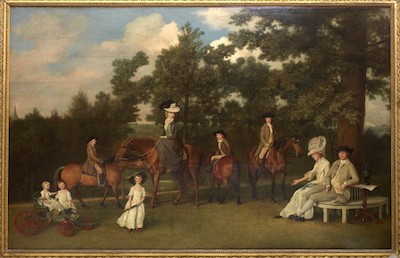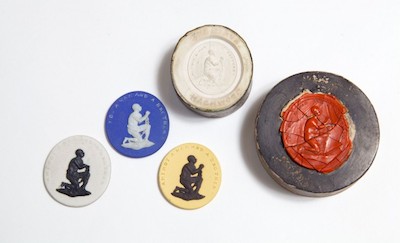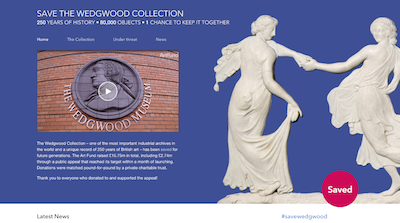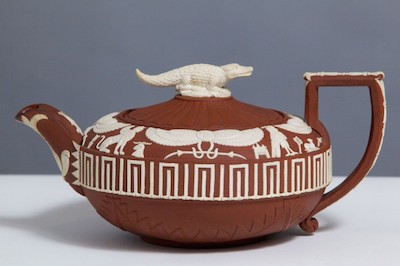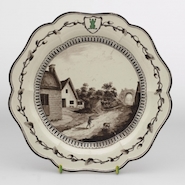 Plate from Green Frog Service, made in 1773 for Catherine the Great
Plate from Green Frog Service, made in 1773 for Catherine the Great
British porcelain maker Wedgwood is keeping its historical archive intact thanks to a public donation campaign that raised money through texts and online.
The Wedgwood Collection, which includes more than 80,000 works of art, manuscripts, photos and ceramics from the brand’s 250-year history, was in danger of being separated and sold off. Two months ahead of schedule, Wedgwood raised the last approximately $4.37 million needed through a public call for donations in partnership with charity organization the Art Fund.
"Wedgwood is a company you can follow through history and preserving this collection ensures that we can understand our past better," said James Dean, vice president and head of the luxury practice at WealthEngine, Bethesda, MD. "The Wedgwood brand’s heritage is well established, and saving this collection just further enhances it.
"Many people have a great appreciation of history, and their heritage and the crowdsourcing efforts paid off because this collection really says something about people’s appreciation for the past," he said.
"I certainly believe that our luxury firms will follow the success of the crowdfunding effort and try to replicate its success for similar causes."
Mr. Dean is not affiliated with Wedgwood, but agreed to comment as an industry expert.
Wedgwood did not respond by press deadline.
Preserving history
The Wedgwood Collection began as a concept with founder Josiah Wedgwood I, who mentioned wanting to save items for posterity as early as 1774, prompting the start of the archives. In 1906, a museum was founded to house items after early experimental pieces were found.
Pieces in the collection include trials of new glazes and materials for both historic and contemporary porcelain, manuscripts and letters, pattern books, artwork and photography.
Wedgwood family portrait by George Stubbs
In addition to telling the story of Wedgwood, the collection highlights the history of industry in Britain over a few centuries.
Slave medallions created by Josiah Wedgwood to promote abolition
When the crowdfunding campaign began on Sept. 1, the Art Fund had already secured about $20.7 million from substantial donors, including the Heritage Lottery Fund, which gave about $17.346 million to the cause. The Art Fund also gave approximately $1.596 million itself.
To raise the last part of the total goal of about $25 million, Wedgwood and the Art Fund appealed to consumers for small donations. A dedicated microsite was set up, where consumers could donate online or follow instructions to text to donate around $16.
Save Wedgwood microsite
Both Wedgwood and the Art Fund raised awareness for the effort on social media
Almost 7,500 individuals donated through the campaign, and a private charity matched each of their donations pound-for-pound. While a number of these responses came from global consumers, around 30 percent came from the Midlands in Britain, where Wedgwood’s Collection is on display at its factory campus in Barlaton, showing the importance of the brand to locals.
Wedgwood Museum
A combination of public donations and giving from local benefactors brought the campaign to a close two months before the intended end date of Nov. 30.
The Art Fund plans to gift the collection to the Victoria & Albert Museum, but keep it on display at the current Wedgwood Museum site. The factory site is in the midst of a $54.3 million renovation, which is expected to be completed in the spring of 2015.
The World of Wedgwood, launching next year, represents a new visitor experience at the museum, which will allow consumers to immerse themselves in the brand heritage with help from the now-saved collection that will be central to the display.
Egyptian-style teapot from 1800
Backing a cause
Usually brands are the benefactors, rather than the beneficiaries, of public donation campaigns.
For example, U.S. fashion label Michael Kors is continuing its efforts to stop world hunger with a host of initiatives in honor of World Food Day on Oct. 16.
In July, the label celebrated 5 million meals served through its partnership with the United Nations’ World Food Programme. Now, Michael Kors is working to spur additional donations with a limited-edition timepiece (see story).
Wedgwood supports its own causes. The brand was the primary sponsor of the British Fashion Council’s millinery project.
BFC “Headonism” showcased the work of a new crop of hat designers during London Fashion Week. This new alliance helped the brand branch out of its own product categories and prove its place within fashionable homes (see story).
This outcome for Wedgwood will have an impact for the brand going forward.
"The heritage is intact, of huge import," said Marie Driscoll, CEO and chief consultant of Driscoll Advisors, New York. "Wedgwood is part of the culture and history of Britain and its people.
"The collection in its entirety allows the Wedgwood to transition into the future and remain a part of the fabric of the British people," she said. "With its homes at the V&A and the Wedgwood Museum, the tradition endures.
"[Wedgwood probably based this on] the knowledge that the Wedgwood brand is much beloved by many Brits and other nationalities too who would be happy to contribute to its enduring and continued contribution to their lives."
For other brands facing a similar dilemma, crowdfunding could be the solution.
"This is an answer for entities that are a part of our lives, our first library, a favorite restaurant," Ms. Driscoll said.
"Here those that contribute can feel good in being generous and enjoy the fruits of their generosity," she said. "Win-win."
Final Take
Sarah Jones, editorial assistant on Luxury Daily, New York

